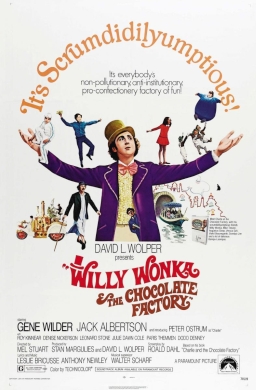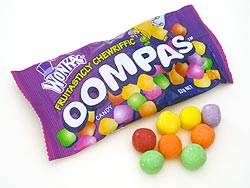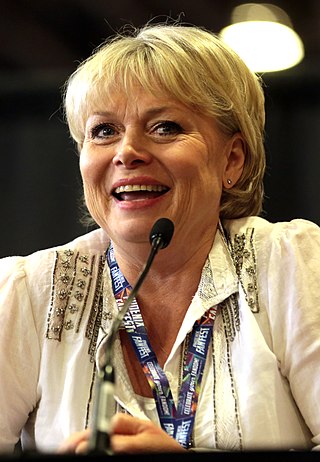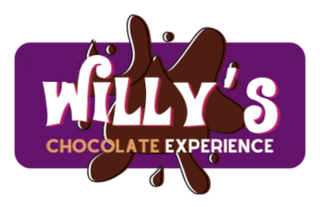
Charlie and the Chocolate Factory is a 1964 children's novel by British author Roald Dahl. The story features the adventures of young Charlie Bucket inside the chocolate factory of eccentric chocolatier Willy Wonka.

Willy Wonka & the Chocolate Factory is a 1971 American musical fantasy film directed by Mel Stuart from a screenplay by Roald Dahl, based on his 1964 novel Charlie and the Chocolate Factory. It stars Gene Wilder as chocolatier Willy Wonka. The film tells the story of a poor child named Charlie Bucket who, upon finding a Golden Ticket in a chocolate bar, wins the chance to visit Willy Wonka's chocolate factory along with four other children from around the world.

Willy Wonka is a fictional character appearing in British author Roald Dahl's 1964 children's novel Charlie and the Chocolate Factory, its 1972 sequel Charlie and the Great Glass Elevator and several films based on those books. He is the eccentric founder and proprietor of the Wonka Chocolate Factory.
Wonka was a confectionery brand owned and licensed by the Swiss corporation Nestlé. In 2018, the branding and production rights were sold to the Ferrero Group.

Charlie and the Chocolate Factory is a 2005 musical fantasy film directed by Tim Burton and written by John August, based on the 1964 children's novel of the same name by Roald Dahl. The film stars Johnny Depp as Willy Wonka and Freddie Highmore as Charlie Bucket, alongside David Kelly, Helena Bonham Carter, Noah Taylor, Missi Pyle, James Fox, Deep Roy, and Christopher Lee. The storyline follows Charlie as he wins a contest along with four other children and is led by Wonka on a tour of his chocolate factory.

Oompas, now discontinued, were candy produced under the Willy Wonka brand name. They were labeled as ‘Peanut Butter Oompas’.

The Wonka Bar was originally a fictional chocolate bar, introduced as a key story point in the 1964 novel Charlie and the Chocolate Factory by Roald Dahl. Wonka Bars appear in each film adaptation of the novel: Willy Wonka & the Chocolate Factory (1971); Charlie and the Chocolate Factory (2005); and Wonka (2023). The bar also appeared in the musical adaptation of the novel, Charlie and the Chocolate Factory (2013).

Julie Dawn Cole is an English psychotherapist and former actress. She began her career as a child performer in the 1971 film Willy Wonka & the Chocolate Factory, playing Veruca Salt.
"Wasted Talent" is the 20th and penultimate episode of the second season of the American animated television series Family Guy, and the 27th episode overall. The episode aired on Fox on July 25, 2000. This episode marks the first time that Chris Griffin has had no speaking lines in an episode. This episode is rated TV-PG-D in the United States and 15 in the United Kingdom.

Charlie and the Chocolate Factory is a 2005 video game which was released on the Game Boy Advance, GameCube, PlayStation 2, Windows and Xbox platforms. It is based on the film of the same name by Tim Burton. The game was released on the same day of the film's theatrical release in the US.

David Seltzer is an American screenwriter, producer and director, perhaps best known for writing the screenplays for The Omen (1976) and Bird on a Wire (1990). As writer-director, Seltzer's credits include the 1986 teen tragi-comedy Lucas starring Corey Haim, Charlie Sheen and Winona Ryder, the 1988 comedy Punchline starring Sally Field and Tom Hanks, and 1992's Shining Through starring Melanie Griffith and Michael Douglas.
Wonka can refer to the following:

Rusty Goffe is an English actor. He is best known for his appearances in Willy Wonka & the Chocolate Factory, Star Wars Episode IV: A New Hope, and the Harry Potter franchise. He played Goober on Stupid!.
The Golden Ticket is an opera based on Roald Dahl's classic 1964 book Charlie and the Chocolate Factory by the contemporary American composer Peter Ash, with a libretto by Donald Sturrock. The Golden Ticket was commissioned by American Lyric Theater, Lawrence Edelson, Producing Artistic Director; and Felicity Dahl. It premiered at Opera Theatre of Saint Louis on June 13, 2010, in a co-production between OTSL, Ireland's Wexford Festival Opera, and American Lyric Theater.

Charlie and the Chocolate Factory is a musical based on the 1964 children's novel of the same name by Roald Dahl, with book by David Greig, music by Marc Shaiman and lyrics by Shaiman and Scott Wittman.

Charlie and the Chocolate Factory is a media franchise based on the 1964 novel of the same name by British author Roald Dahl. It includes two books, three live-action theatrical films, three video games and miscellaneous other properties, such as touring musicals and theatrical adaptations, various merchandise and defunct amusement park ride.

Tom and Jerry: Willy Wonka and the Chocolate Factory is a 2017 American animated direct-to-video musical comedy film starring the cat-and-mouse duo Tom and Jerry. Produced by Warner Bros. Animation and Turner Entertainment Co., it is the first Tom and Jerry direct-to-video film to be distributed by Warner Bros. Home Entertainment internationally and is also the final Tom and Jerry direct-to-video film to be involved with Warner Bros. Animation's founder Hal Geer, who died on January 26, 2017. The film is an animated adaptation of the 1971 film Willy Wonka & the Chocolate Factory with the addition of Tom and Jerry as characters and seen through their point of view.

Wonka (Original Motion Picture Soundtrack) is the soundtrack to the 2023 musical fantasy film of the same name co-written and directed by Paul King, and co-written by Simon Farnaby. Based on the origin story of Willy Wonka, a character in the 1964 novel Charlie and the Chocolate Factory by Roald Dahl, the film stars Timothée Chalamet in the lead role, with an ensemble cast. The album features seven original songs composed by Neil Hannon and written by King and Farnaby, further accompanied by the cues from the original score composed by Joby Talbot. The songs are performed by the cast members, including Chalamet (in his singing debut). The soundtrack was released by WaterTower Music on 8 December 2023.

Willy's Chocolate Experience was an unlicensed event based on Charlie and the Chocolate Factory that took place in Glasgow, Scotland, in February 2024. The event was promoted as an immersive and interactive family experience, illustrated on a promotional website with "dreamlike" AI-generated images. After it was discovered that the event was held in a sparsely decorated warehouse, many customers complained, and the police were called to the venue. The event went viral on the Internet and attracted worldwide media attention.















